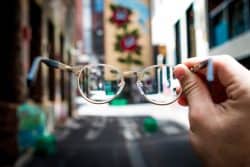Spring is such a great season. Warm winds, longer daylight hours and, unfortunately, allergies. Do you get red, itchy, watery eyes every year around this time? One in five Americans get eye allergy symptoms at this time of year, so you are not alone. Finding relief may be hard, but we have a few suggestions for you so you can enjoy the outdoors, again, this spring and summer.

What are seasonal eye allergies?
Eye allergies are also called ocular allergies and have common symptoms that are both annoying and can be unsightly. Symptoms could include:
- red, itchy, burning, and watery eyes
- swollen or puffy eyelids
- temporary blurriness
If using over the counter allergy medicines do not seem to reduce symptoms see your eye doctor to check for other eye disorders. Seasonal eye allergies happen only at certain times of the year—usually early spring through summer and into autumn. Usually the cause is pollen from trees, flowers, grasses or possibly the mold from spores in the yard.

Methods to Reduce your Eye Allergy Symptoms
- Keep your windows shut during the night due to tree and flower pollen being released early in the morning. Run the air conditioning during the night to keep air moving. This will keep pollen out of your bedroom and home.
- Stay indoors when pollen counts are highest, usually in mid-morning and early evening.
- Clean surfaces regularly to keep pollen from building up and irritating you in your home.
- Wear sunglasses to block pollen from entering your eyes.
- Don’t rub your eyes. That’s likely to make symptoms worse. Try cool compresses instead.
If you find that antihistamines and over the counter drops are not helping, you may need to see your eye doctor to rule out eye diseases that could be confused as eye allergies. Eye doctors can prescribe stronger medications to stop the allergy or, at least, reduce the symptoms. Call us at Boston Eye Physicians and Surgeons at 617-232-9600.

